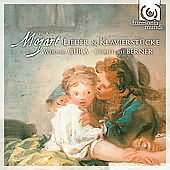From the first song, “Die Verschweigung”, tenor Werner Güra assures us that we’re in for a lively, engaging recital with a gorgeous, technically and expressively assured voice on full display. Güra leaves no doubt that he loves singing these songs, which include several of the more commonly performed ones–Das Lied der Trennung; Das Veilchen; Das Traumbild; An Chloë–along with lesser-known pieces, all of them worthy examples of Mozart’s finest creations in a genre for which he’s all-too-infrequently recognized. Several of the songs show a clear and fascinating link direct to Schubert–Das Lied der Trennung; An Chloë; Der Frühling–while others–Das Traumbild; Das Veilchen–are as purely Mozartean as anything he ever wrote. Güra is so naturally expressive, so “inside” of these songs, and so able to capture and project both their tenderly lyrical character and more dramatic aspects that you easily forget most of the sopranos who usually sing them.
Among the more memorable examples of Güra’s expressive vocal prowess are the superb phrasing in “Sei du mein Trost” and “Das Lied der Trennung”, the marvelously varied inflections in “Der Frühling”, the dramatic development in “Dans un bois solitaire”, and the consummate artistry and unerring control of voice and mood in “Abendempfindung an Laura”.
Some interesting and unusual piano pieces, including the Rondo in F major K. 494 (normally heard in its later incarnation in the K. 533 piano sonata), the strange D minor Fantasie K. 397, and the rarely heard G major Eine kleine Gigue K. 574, are placed throughout the recital. Christoph Berner performs them–as he does the song accompaniments–on a Streicher pianoforte, which has a very appealing, bright upper register (prominently displayed in the Rondo) and a starkly contrasting, big, thrumming lower register (vividly utilized in the Fantasie).
The performances show an opulence and attention to articulation and dynamics that revels in but doesn’t abuse the full range and voice of the instrument. My only question is why Berner chose this particular piano–the Streicher instruments were not contemporaneous with Mozart and were a far more prominent part of the 19th century than the 18th. So if you’re not going to employ a “real” period instrument, why not just use a modern concert grand instead? That personal quibble aside, listeners interested in some scintillating and even enlightening Mozart shouldn’t miss this. [7/16/2008]
































